牛津沪教版六年级上6A-Unit 3 知识点梳理 + 拓展阅读
沪教牛津版六年级英语上册全册知识点点汇总

沪教牛津版六年级英语上册全册知识点点汇总沪教牛津版六年级英语上册全册知识点汇总Module 1 Getting to know each other一、核心词汇1.表示时间名词:month 一个月的时间;月份yesterday 昨天2.形容词:cute 可爱的pretty 漂亮的handsome 英俊的;帅气的famous 著名的;出名的healthy 健康的;有益于健康的unhealthy 不健康的;损害健康的3.动词:catch 逮住;捕捉spend 度过pick 采摘4.食物名词:hamburger 汉堡包fruit 水果pie 馅饼pizza 比萨饼cola可乐sandwich三明治vegetable 蔬菜chicken 鸡肉chocolate 巧克力5.表示动物名词:turtle 乌龟fly 苍蝇6.其他:during 在……期间everyone 每个人;所有人countryside 乡村;农村7.核心词组:grow up长大;成长junior high school 初级中学(be)born 出生summer holiday 暑假the Great Wall 长城the Palace Museum 故宫博物院Tian’an men Square 天安门广场go swimming 去游泳go to the museum 去博物馆go to the cinema 去电影院junior high school 初级中学do my homework 做我的家庭作业watch TV看电视visit my friends 拜访我的朋友 a little 少量的fish and chips 炸鱼薯条二、了解词汇1.一些动词及过去式:go(去)—went do(做)—didhave/has(有)—had watch(观看)—watchedvisit(访问;探望)—visited am/is(是)—was are(是)—were2.一些食物名词:egg 鸡蛋bread 面包noodles 面条dumplings 饺子3.其他:menu菜单三、核心句型1.Her hair was short and her eyes were big. 她那时头发很短而且眼睛很大。
沪教版牛津英语六年级上册知识要点总结
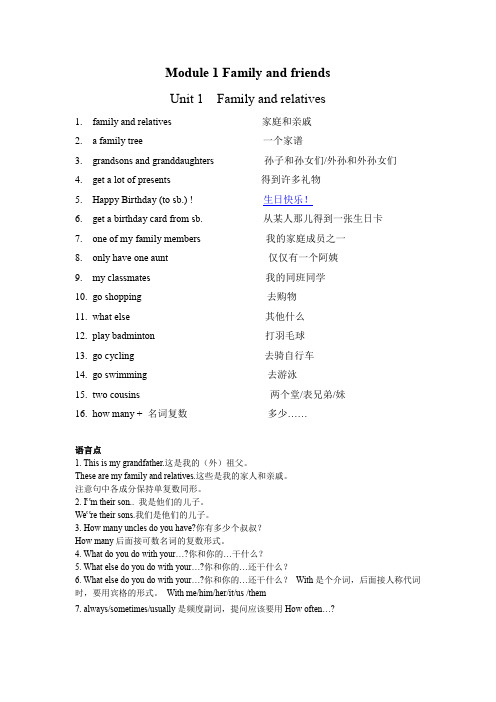
Module 1 Family and friendsUnit 1 Family and relatives1.family and relatives 家庭和亲戚2. a family tree 一个家谱3.grandsons and granddaughters 孙子和孙女们/外孙和外孙女们4.get a lot of presents 得到许多礼物5.Happy Birthday (to sb.) ! 生日快乐!6.get a birthday card from sb. 从某人那儿得到一张生日卡7.one of my family members 我的家庭成员之一8.only have one aunt 仅仅有一个阿姨9.my classmates 我的同班同学10.go shopping 去购物11.what else 其他什么12.play badminton 打羽毛球13.go cycling 去骑自行车14.go swimming 去游泳15.two cousins 两个堂/表兄弟/妹16.how many + 名词复数多少……语言点1. This is my grandfather.这是我的(外)祖父。
These are my family and relatives.这些是我的家人和亲戚。
注意句中各成分保持单复数同形。
2. I‟m their son.. 我是他们的儿子。
We‟re their sons.我们是他们的儿子。
3. How many uncles do you have?你有多少个叔叔?How many后面接可数名词的复数形式。
4. What do you do with your…?你和你的…干什么?5. What else do you do with your…?你和你的…还干什么?6. What else do you do with your…?你和你的…还干什么?With是个介词,后面接人称代词时,要用宾格的形式。
沪教牛津版六年级上册英语全册教案(含单元知识点总结)
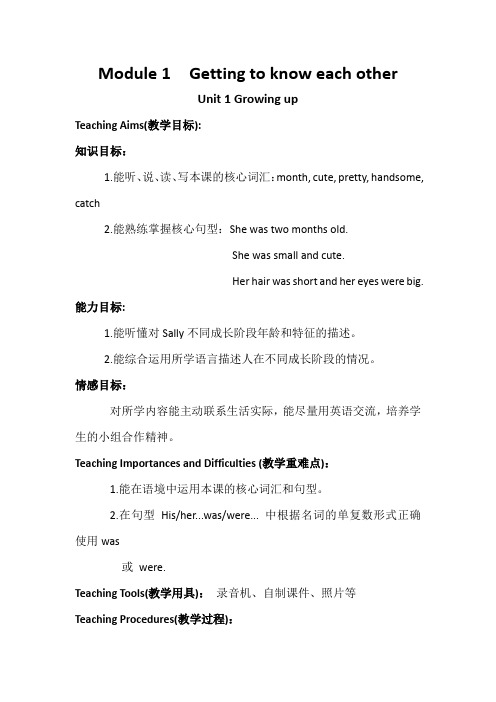
Module 1 Getting to know each otherUnit 1 Growing upTeaching Aims(教学目标):知识目标:1.能听、说、读、写本课的核心词汇:month, cute, pretty, handsome, catch2.能熟练掌握核心句型:She was two months old.She was small and cute.Her hair was short and her eyes were big.能力目标:1.能听懂对Sally不同成长阶段年龄和特征的描述。
2.能综合运用所学语言描述人在不同成长阶段的情况。
情感目标:对所学内容能主动联系生活实际,能尽量用英语交流,培养学生的小组合作精神。
Teaching Importances and Difficulties (教学重难点):1.能在语境中运用本课的核心词汇和句型。
2.在句型His/her...was/were... 中根据名词的单复数形式正确使用was或were.Teaching Tools(教学用具):录音机、自制课件、照片等Teaching Procedures(教学过程):StepⅠ.Warm up and revision(热身与复习)1. Greetings.2. Do some warming-up exercises.3. Review the numbers.Step Ⅱ.Presentation and practice(呈现新语言知识和练习)1. Lead in.T: How old are you?S1: I’m eleven years oldT: You’ll be twelve years old next year. You’re growing up.2. Show some photos and introduce the new words.3. Learn to say and use the words.4. Talk about the photos of Sally.5. Watch the screen and learn to say the sentences.6. Ask pupils to practise in groups.Sept Ⅲ. Learn the story (学习课文)1. Read the story and learn to say the useful sentences.2. Watch the cartoon.Module 1 Getting to know each otherUnit 2 My summer holidayTeaching Aims(教学目标):1.能听、说、读、写本课的核心词汇:famous, during, spend, everyone,countryside2.能熟练掌握核心句型:How was your summer holiday?It was wonderful. We went to the Great Wall.Everyone had a good time.3.读懂有关暑假生活的对话,学会询问别人和介绍自己的暑假生活。
上海牛津版英语六年级上册六上6AUnit3U3同步讲义教案

学员编号:年级:课时数:学员姓名:辅导科目:英语学科教师:授课类型TUnit3(牛津6上)基础知识梳理 C T教学目标使学生能够基本掌握牛津6年级上册Unit3中的基础词汇及重要句型星级★★★★授课日期及时段T同步-U3基础知识梳理(建议2-5分钟)批注:上面一幅图片是好朋友出游的图片,可以和学生一起聊去过哪些地方,还打算去哪些地方,远还是近,在哪?(建议20-25分钟)一、词汇与词组Words and words phrases1 .s p e n d v.度过(spend --- spent – spent)eg:They want to spend their summer holiday in the countryside.他们想去乡下过暑假。
【知识拓展】spend v. 花费(时间,金钱)批注:可扩展讲spend , take , cost 的用法① spend 主语为“人”② take 主语可以是“事或物”(包括形式主语it)③ cost 主语是“物”2. l u c k y a d j.好运的;幸运的eg: a lucky dog 幸运儿【知识拓展】luck n. 运气eg: Good luck! 祝你好运!批注:可给学生提下unlucky不幸,un-是否定前缀,并举例unhappy ,unlike,unfit,unfair,unusual等3.a c t i v i t y n.活动eg: Our school offers a lot of interesting activities to us.【知识拓展】active adj. 活跃的;积极的eg: Mary is always active in the party4 . c o l l e c t v.收集collect shells/ stamps 收集贝壳/邮票【知识拓展】collection n. 收藏品,收集物eg: The collection of these stamps took ten years.批注:tion是名词后缀,invitation, invention, information等5. p l a n v.计划plan to do sth 计划做某事eg: I plan to go to see a movie tonight.【拓展】plan n. 计划;方案eg: What's your plan for the weekend? 你打算如何过周末?二、重要句型Important Sentences structures1. I s S a n d y B a y n e a r o r f a r a w a y f r o m S p r i n g B a y?注意:①本句为选择疑问句,注意or的用法②在near 后直接跟地点,而在用far away from时,地点前不能遗漏介词from.far away from 也可用far from 来表达。
牛津英语上海版六年级第一学期 6A Unit 3教案(4课时,含教后感)
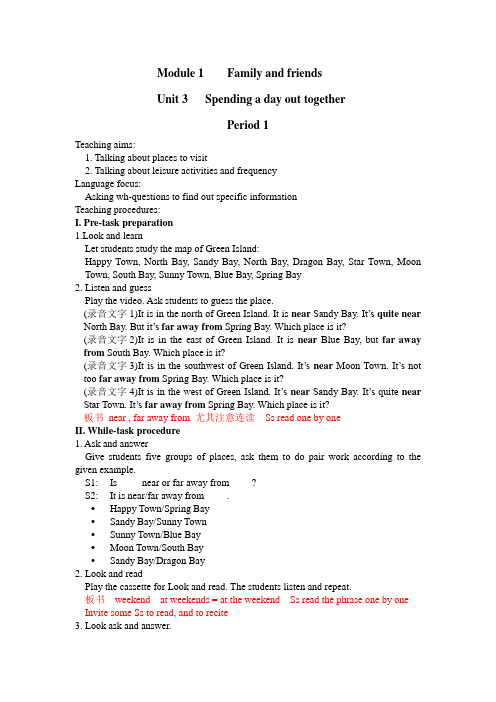
Module 1 Family and friendsUnit 3 Spending a day out togetherPeriod 1Teaching aims:1. Talking about places to visit2. Talking about leisure activities and frequencyLanguage focus:Asking wh-questions to find out specific informationTeaching procedures:I. Pre-task preparation1.Look and learnLet students study the map of Green Island:Happy Town, North Bay, Sandy Bay, North Bay, Dragon Bay, Star Town, Moon Town, South Bay, Sunny Town, Blue Bay, Spring Bay2. Listen and guessPlay the video. Ask students to guess the place.(录音文字1)It is in the north of Green Island. It is near Sandy Bay. It’s quite near North Bay. But it’s far away from Spring Bay. Which place is it?(录音文字2)It is in the east of Green Island. It is near Blue Bay, but far away from South Bay.Which place is it?(录音文字3)It is in the southwest of Green Island. It’s near Moon Town. It’s not too far away from Spring Bay.Which place is it?(录音文字4)It is in the west of Green Island. It’s near Sandy Bay. It’s quite near Star Town. It’s far away from Spring Bay. Which place is it?板书near , far away from 尤其注意连读Ss read one by oneII. While-task procedure1. Ask and answerGive students five groups of places, ask them to do pair work according to the given example.S1: Is ____ near or far away from ____?S2: It is near/far away from ____.•Happy Town/Spring Bay•Sandy Bay/Sunny Town•Sunny Town/Blue Bay•Moon Town/South Bay•Sandy Bay/Dragon Bay2. Look and readPlay the cassette for Look and read. The students listen and repeat.板书weekend at weekends = at the weekend Ss read the phrase one by one Invite some Ss to read, and to recite3. Look ask and answer.Ask students to talk in pairs what they usually do at weekends according to the map and pictures.Dialogues are given like this:S1: What do you usually do at weekends?S2: I usually … in _____ (place).S1: Is _____ near or far away from _____?S2: It’s near/far away from _____.III. Post-task activities1. Ask and answerInvite students to ask their classmates/teachers about what they usually do at weekends and where they do it, like this:S1: What do you usually do at weekends?S2: I usually … in _____ (place).S1: Is _____ near or far away from _____?S2: It’s near/far away from _____.2. Listen and sayPlay the cassette of two dialogues, ask students to complete the table.1) Miss Guo usually goes to ______________ in ______________. She usually___________ in __________________. It is ________________ her home.2) Miss Guo usually _________ to __________________ in ___________. Sheusually ________________ in _____________________________. It is ________________ her home.Show the dialogues to Ss, read together.(3.Option 1. Look and sayAsk students to do pair work according to the map of Shanghai.•Talk in pairs about what you do at weekends and where you usually go at weekends.•Then talk about whether the places you go to are near or far away from your home.•You may also talk like this: Nanjing Road is near the Bund, but far away from Xujiahui.•You can talk about the places which are not marked on the map. 不上)Consolidation1.Workbook 6A P152.Copy the new words & phrases3.Recite the text on P16教后记:课文简单易学,只是在读map时和学习far away from 连读时,用时较多,特别是连读,有些学生多次提醒仍是忘记。
沪教牛津版六年级英语上册Module 3 Out and about 知识点清单
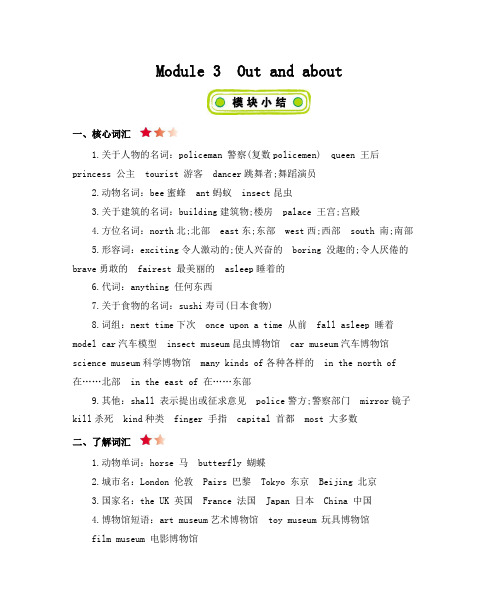
Module 3 Out and about一、核心词汇1.关于人物的名词:policeman 警察(复数policemen) queen 王后princess 公主tourist 游客dancer跳舞者;舞蹈演员2.动物名词:bee蜜蜂ant蚂蚁insect昆虫3.关于建筑的名词:building建筑物;楼房palace 王宫;宫殿4.方位名词:north北;北部east东;东部west西;西部south 南;南部5.形容词:exciting令人激动的;使人兴奋的boring 没趣的;令人厌倦的brave勇敢的fairest 最美丽的asleep睡着的6.代词:anything 任何东西7.关于食物的名词:sushi寿司(日本食物)8.词组:next time下次once upon a time 从前fall asleep 睡着model car汽车模型insect museum昆虫博物馆car museum汽车博物馆science museum科学博物馆many kinds of各种各样的in the north of 在……北部in the east of 在……东部9.其他:shall 表示提出或征求意见police警方;警察部门mirror镜子kill杀死kind种类finger 手指capital 首都most 大多数二、了解词汇1.动物单词:horse 马butterfly 蝴蝶2.城市名:London 伦敦Pairs 巴黎Tokyo 东京Beijing 北京3.国家名:the UK 英国France 法国Japan 日本China 中国4.博物馆短语:art museum艺术博物馆toy museum 玩具博物馆film museum 电影博物馆5.有名的建筑:Tian’anmen Square 天安门广场the Palace Museum 故宫博物院the Louvre Museum 罗浮宫Big Ben 大本钟三、核心句型1.— Shall we go and see a film this weekend?我们这个周末去看电影好吗?— Sure.当然可以。
牛津沪教版英语六年级上6A寒假复习Module 3辅导讲义

14. need to do sth.需要做某事
15. would like noodles for dinner晚餐想吃面条
16. like seafood喜欢海鲜
17. in the market在市场
18. in the supermarket在超市
on both sides of the bread在面包的两边
put the pizza in a hot oven把比萨放在一个热烤箱里
bake it for 5 minutes烤十分钟
pastry面团
cheese奶酪
strawberry草莓
onion洋葱
pineapple菠萝
sweetcorn甜玉米
Unit9
1. have a picnic进行一次野餐
2. a good idea一个好主意
3. a bottle of jam一瓶果酱
4. taste delicious/ tasty尝起来味道很美
5. a packet of nuts一包坚果
6. soft drinks软饮料
7. Let’s do…, shall we?我们一起做…,好吗?
beef牛肉
cherry樱桃
other ingredients其它的作料
The Wangs王先生一家人
order food and drink点食物和饮料
(二)课内语言点&语法知识梳理
Unit8
1.also adv.也
例:Eric can swim. His little brother can also swim.
= Eric can swim. His little brother can swim, too.
上海牛津六年级上6A各单元知识梳理

预初期末复习Module 1 Unit 1 family and relatives 单元重点1.关键词汇Relative :grandfather, grandmother, grandson, granddaughter, uncle, aunt, cousinFamily tree, family members :father, mother, son, daughter, brother, sisterplay games/football/badminton ;go shopping/swimming/cycling ;go to a restaurant/the park ;watch TV/a film ,only ,else ,classmate2.语言功能Asking for information 询问信息1)A :How many + 名词复数+ do you have ?B :I only have one……/ I have (number)……2)A :What (else)do you do with your + 名词?B :I always / usually / sometimes / never do sth. with my + 名词Introduction 介绍:This is ……/ These are ……Express good wishes 表示祝愿:Happy birthday !3. 语法要点1)频度副词always ,usually ,often ,sometimes 和never 在一般现在时中的用法:放在be 动词、助动词后面,放在行为动词前面。
She is often late for school .When do you usually do in the morning ?He usually goes to bed in the morning .1. 主格做主语,放在句首:I often go to the supermarket . (me)2. 宾格做宾语,放在动词、介词的后面:I sometimes go shopping with him (he)3. 形容词性物主代词做定语,放在名词前面:后面必须加名词Our classroom is very big and clean. (we)4. 名词性物主代词做主语、宾语、表语:后面不能加名词Is this her T shirt ?No ,hers is red . (she)That new flat is ours . (we)3) 一般现在时:主语除了是三单主语是第三人称单数I go to school on foot . She goes to school on foot .I don’t go to school on foot . She doesn’t go to school on foot .Do you go to school on foot ?Does she go to school on foot ?Yes ,I do . / No ,I don’t Yes she does . / No ,she doesn’t动词变化①以s ,x ,ch ,sh ,o结尾+es ;②以辅音字母+y结尾,去y+ies ;③have…hasModule 1 Unit 2 I have a good friend 单元重点1.关键词汇词性转换:friend n. ……friendly a. ……friendship n.help n. v. ……helpful a. ……helpless a.kind a. ……kindness n. ……kindly ad.pollute v. ……pollution n.discuss v. ……discussion n.use v. ……reuse v. ……useful a. ……useless a.angry a. ……angrily ad. ……anger n.visit n. v. ……visitor n.词组:talk to/with sb talk about sth = discuss sthlike to do/doing enjoy doingevery day every night/morning/afternoongo out at night walk to school = go to school on footbe together play togethereat one’s lunch share one’s foodhelp each other each other = one anotherhelp other people other people = othersbe late for ask sb about sthwork hard be kind toget angry get coldshare sth with sb tell lieslive in the USA visit Garden Cityfor the first time on Saturdaya friend of the Earth pick up rubbishlook after = take care of = care for all the things around uspollute the environment air/land/water/noise pollutionkeep ……clean keep + adj; keep quiteput rubbish into rubbish bins leave rubbishtell sb to do ; tell sb not to do ask , invite , allow , want sb not to dowant to be want/agree/decide/hope/offer/try/manage + to do promise to do ; promise not to do discuss sth with sb2.语言功能1)A :Thank you! B :Not at all./ You’re welcome./ It’s a pleasure./ That’s all right.2) A :We want to look after the environment . B :All right .3.语法要点1)We like to + v ……together2)be + adj :She is always naughty/clever/friendly/helpfui比较:She always gets angry . She never tells lies.3) A:Where have you been ? B:I have been to ……A:Have you been to ___________yet?B: yes, I have just /already been to ______./Y es , I have just /already been there.No, I haven’t been to ______yet. / no, I haven’t been there yet.4) we promise to .../we promise not to ..Module 1 unit3 spending a day out together1. 关键词汇词性转换happy a.------- happily ad. -------unhappy a.sand n. ---------sandy a.sun n. -------sunny a.cloud n.-------- cloudy a. wind n. ------windy a.rain n. ------rainy a. snow n. ------snowy a.luck n. ------lucky a. ------luckily ad. ------ unlucky a.act v. ------activity n. ------ actor n. ------ actress n. ------action n.collect v. ------ collection n.important a. ------importance n.special a. ------specially ad.词组:At weekends= at the weekend on weekdaysBe far away from be nearIn sandy bay/ sunny town on lucky islandCome with sb space museumA photo of me the students of class threeBuy tickets eat ice creamHave a barbecue/a picnic/lunch/dinner spend a holidayFly tickets ride bicycles= cycleMake sandcastle collect shellsMake an album come backPlan a visit plan to do sthCome back make some notesGet there get to ShanghaiMy sixtieth birthday her ninth birthdayHave a big birthday party have a good time = enjoy oneselfPlay with sb get enough food for the party2. 语言功能1)A: Let’s go to Ocean Park . B : That’s a good idea./All right.2)A: Where have you been in -----? B: I have been to ----in---with sb3) A: Which place shall we visit? B: Shanghai MuseumWhen shall we go there ? On SaturdayWhat time ---? 9 o’clockHow are we going to get there ? By undergroundHow much does it cost? = How much is it ?How much do they cost ? = How much are they ?3. 语法要点1) 表示建议How about + n/doing? How about playing badminton?What about + n/doing? What about playing badminton?Why not + do ? Why not play badminton.Why don’t you + do? Why don’t you play badminton?Let’s + do . Let’s play badminton.2) 现在进行时表示说话正在发生的动作或目前这一阶段正在进行的动作’s nine.搭配Module 2 Unit 4 What would you like to be 单元重点1词性转换:secret a.-------secretary n .teach n.-------teacher n .drive n.-------driver n .work v .------worker n .safe n .a.-----safely ad.------safety a.fire n.-------fireman n.post .v.-----postman n. ----postage n-----poster ncook v.------cook n.-------cooker n.2词组:1.find out Please find out who broke the window .find At last he found his English book.look for Alice is looking for her new watch .2.interview sb interview her3.start work4.finish work5.put sth together6.stick sth on a display board7.in the morning/afternoon/eveningOn a cold morning on Sunday afternoon/on the evening of July 18.make our city a safe placemake sth for sb =make sb sth make a cake for us =make us a cakemake sb+adj. make me happy9.eight years old3.语言功能A.表达愿望(wishes)Would you like to be a policeman ?—Yes, I would./ No, I would not.B. 陈述原因(give reasons)Why……?Because……4.语法要点:A.I’d=I would ; would not =wouldn’tB. would like to 与want to 的转换I would like to be a nurse .=I want to be a nurse.I wouldn’t like to be a nurse.=I don’t want to be a nurse .Would you like to be a nurse ?=Do you want to be a nurse ?She would like to be a nurse.=She wants to be a nurse .She wouldn’t like to be a nurse.=She doesn’t want to be a nurse .Would she like to be a nurse?=Does she want to be a nurse ?5.职业A cook cooks food for people.A secretary takes notes and answers phones.A dentist looks after people’s teeth.A doctor makes sick people better.A nurse helps make sick people better.A pilot flies a plane.A shop assistant sells things to people.A factory worker makes things in a factory.A fireman puts out fires.A bank clerk receives money and gives money in a bank.Module 2 Unit 5 Open Day 单元重点1.词性转换:1. enter v.----------entrance n.2. music n. -------musical a.3.final a.--------finally ad.4.invite v.------invitation n.5.act v.--------activity n.6. different a.----difference n.2.词组:1.arrive at (小)in(大)+地点get to +地点到达某地Arrive at school arrive in Shanghai get to Shanghai reach Shanghai比较:arrive home/here/there get home reach home2.meet sb at +地点meet Mary at the entrance3.visit sb/sp. Visit Mr. Wang/visit Beijing4.look at sb/sth look at class project/look at me5.listen to sb/sth listen to him /listen to the music6.the Arts and Crafts room English club noticeboard7.in the library in the hall in the music room in classroom 6A8.have tea and cakes9.want sb to do sth want us to make notes10.welcome sb welcome the parents11.on the open day 12.in different places13.on the second floor 14.teachers’office15. invite sb to do sth invite Lily to have a picnic16.take some photos complete the article17. have a good time =have a great time =enjoy oneself=enjoy one’s time3.语言功能:A.询问信息(Asking for information)--When What time Where WhatWhere will kitty be? Kitty will be in the music room.B.用副词表达事情得进展顺利。
沪版牛津英语六年级上知识点整理(K12教育文档)

沪版牛津英语六年级上知识点整理(word版可编辑修改)编辑整理:尊敬的读者朋友们:这里是精品文档编辑中心,本文档内容是由我和我的同事精心编辑整理后发布的,发布之前我们对文中内容进行仔细校对,但是难免会有疏漏的地方,但是任然希望(沪版牛津英语六年级上知识点整理(word版可编辑修改))的内容能够给您的工作和学习带来便利。
同时也真诚的希望收到您的建议和反馈,这将是我们进步的源泉,前进的动力。
本文可编辑可修改,如果觉得对您有帮助请收藏以便随时查阅,最后祝您生活愉快业绩进步,以下为沪版牛津英语六年级上知识点整理(word版可编辑修改)的全部内容。
Module 1 Family and friendsUnit 1 Family and relatives1.family and relatives 家庭和亲戚2. a family tree 一个家谱3.grandsons and granddaughters 孙子和孙女们/外孙和外孙女们4.get a lot of presents 得到许多礼物5.Happy Birthday (to sb.) !生日快乐!6.get a birthday card from sb. 从某人那儿得到一张生日卡7.one of my family members 我的家庭成员之一8.only have one aunt 仅仅有一个阿姨9.my classmates 我的同班同学10.go shopping 去购物11.what else 其他什么12.play badminton 打羽毛球13.go cycling 去骑自行车14.go swimming 去游泳15.two cousins 两个堂/表兄弟/妹16.how many + 名词复数多少……语言点1。
This is my grandfather。
这是我的(外)祖父。
These are my family and relatives。
牛津沪教版英语六年级上6A-Unit3

牛津沪教版英语六年级上6A-Unit3六年级上U3Ⅰ. Words.1. spend v. 度过;花费How do you spend your spare time? 你怎么打发业余时间?How much did Kitty spend at the supermarket?基蒂在超市花了多少钱?【提示】spend (money or time) on sth意为“花(钱或时间)在某事物上”,如:I spent¥30 on this book. 这本书我是花30元买的。
Lily spends a lot of time on her work. 莉莉在她的工作上倾注大量时间。
spend (money or time) (in) doing sth意为“做某事花了多少(钱或时间)”,如:I spent¥30 (in) buying this book.这本书我是花30元买的。
Lily spends a lot of time (in) doing her work.莉莉在她的工作上倾注大量时间。
2. island n. 岛屿There aren't any big islands east of Hong Kong Island.香港岛的东面没有大的岛屿.3. bay n. 海湾He painted a picture of a fishing village in the bay. 他画了海湾里一个渔村。
4. dragon n. 龙5. weekend n. 周末Lanny came home for the weekend. 兰尼回家度周末。
How was your weekend?你周末过得如何?6. seaside n. 海边;海滨We spent the weekend at the seaside.我们在海边度周末。
7. 1ucky adj.好运的;幸运的I am lucky to meet you here.我在这儿能见到你,真走运。
上海版牛津英语六年级(上下)全重点知识点复习整理

上海版牛津英语六年级(上下)全重点知识点复习整理上海版牛津英语六年级(上、下)全重点知识点复习整理上海牛津英语六年级上下册全知识点梳理频度副词always/sometimes/usually/never是频度副词,提问应该要用howoften??在句中的边线就是:放到犯罪行为动词的前面,放到be动词的后面。
也可以说道“行前系后”。
e.gsheisalwayskind.她总是很正直的。
shealwayshelpsotherpeople.她总是帮助其他人。
不能出现这样的句子:sheisalwayshelpsotherpeople.(×)一句话中无法同时发生两个动词。
并且必须特别注意主谓保持一致,尤其特别注意第三人称单数不可以忽略。
howoften与howmanytimeshowoften回答“频率次数+时间范围”howmanytimes回答“频率次数”e.g.―howoftendoyouexercise?―twiceaweek.―howmanytimeshaveyoubeenthere?―twice.副词则表示动作特征或性状特征。
通常用以形容或润色除了名词和代词以外的词,主要润色形容词、动词、其他副词和句子。
helooksveryhappy.(润色形容词)theoldladyiswalkingslowlynow.(修饰动词)luckily,hegotthefirstprize.(修饰句子)形容词后面+ly构成副词:slow―slowlyslight―slightlyquick―quicklycareful―carefullyfierce―fiercelyim mediate―immediatelygentle―gentlylucky―luckilyhappy―happily介词whatelsedoyoudowithyour??你和你的?还干什么?with就是个介词,后面直奔人称代词时,必须用宾格的形式。
牛津苏教版-英语-六年级上册-6A Unit3 It was there知识点讲解
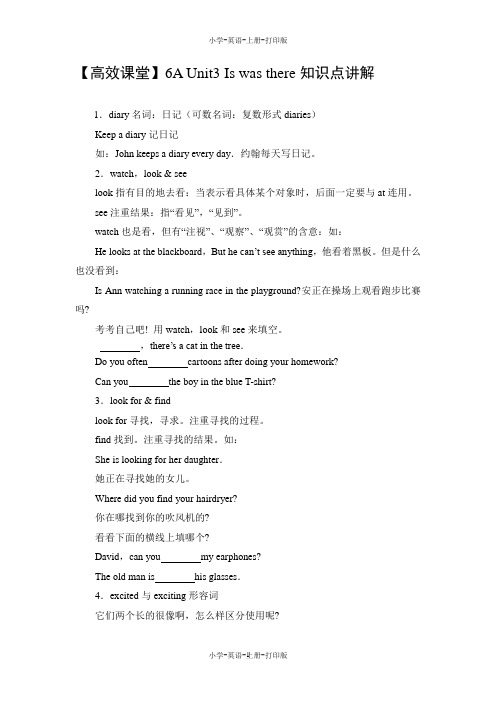
【高效课堂】6A Unit3 Is was there知识点讲解1.diary名词:日记(可数名词:复数形式diaries)Keep a diary记日记如:John keeps a diary every day.约翰每天写日记。
2.watch,look & seelook指有目的地去看:当表示看具体某个对象时,后面一定要与at连用。
see注重结果:指“看见”,“见到”。
watch也是看,但有“注视”、“观察”、“观赏”的含意:如:He looks at the blackboard,But he can’t see anything,他看着黑板。
但是什么也没看到:Is Ann watching a running race in the playground?安正在操场上观看跑步比赛吗?考考自己吧! 用watch,look和see来填空。
,there’s a cat in the tree.Do you often cartoons after doing your homework?Can you the boy in the blue T-shirt?3.look for & findlook for寻找,寻求。
注重寻找的过程。
find找到。
注重寻找的结果。
如:She is looking for her daughter.她正在寻找她的女儿。
Where did you find your hairdryer?你在哪找到你的吹风机的?看看下面的横线上填哪个?David,can you my earphones?The old man is his glasses.4.excited与exciting形容词它们两个长的很像啊,怎么样区分使用呢?excited,(用于形容人)激动的,兴奋的exciting,(用于形容事物)令人激动的,令人兴奋的。
如:Why are the students so excited?学生们为什么这么兴奋?The football match is very exciting.这场篮球比赛非常紧张刺激。
牛津沪教版六年级上6AUnit3-Unit4重要知识点复习(word文档物超所值)
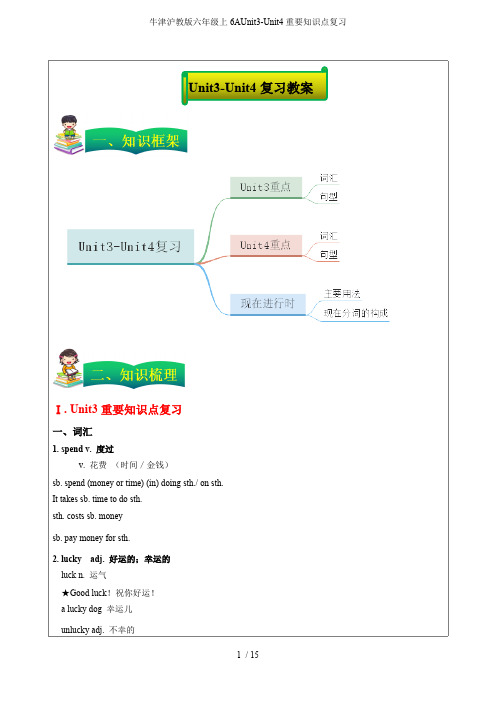
3. activity n. 活动active adj. 积极的;活跃的action n.活动be active in 在某方面积极的take action to do sth. 采取行动做某事4. collect v.收集collection n. 收藏品,收集物collect stamps 集邮5. plan v. 计划plan to do sth 计划做某事plan n. 计划;方案make a plan to do sth. 制定方案做某事二、语法和重点句型1. Is Sandy Bay near or far away from Spring Bay?选择疑问句中or 表示选择,回答必须二者选其一,不可回答yes或no。
near+ sp. 离...近的far away from+ sp. 离...远的2. have/ has been to 去过(回来了)have/ has gone to 去了(还没回来)have/ has been in 呆在那3. am/ is/ are going to+动词原形I’m going to write a letter to my elder sisterThey are going to visit their grandparents tomorrow.★will+动词原形也表示一般将来时4. How about …..?How (What) about + n. / doing?表示建议时= Let’s do sth.= Shall we do sth.?= Why not do sth.?= Why don’t you do sth.?5. 时间介词in, on, at的用法on+具体某一天或星期on Tuesday morningon Sundayon 10th Marchin+世纪/年/月/季节/泛指的早晚in 1949in spring / summer / autumn / winterin January / February / Septemberin the morning / afternoon / eveningat+具体的时刻,正午或午夜at noonat night = in the eveningat four o’clockat weekends = at the weekend6. a photo of + 人称代词宾格a photo of + 名词性物主代词a photo of me 一张有我的照片a photo of mine 我的一张照片【课堂小练】Ⅰ.Choose the best answer.(选择最佳答案)(错误率:掌握情况:)( )1. The book me ten yuan·A. spendB. costC. eatD. take( )2. Jerry is my best friend.He often his food with me·A. shareB. sharingC.sharesD. to share( )3. Peter often plays football with his friends on Sunday.A. theB. aC. an D· /( )4. Father's Day is coming.Let’s make a cake our father.A. forB. withC. toD. from( )5. Have you ever Dragon Bay?A. gone toB. been toC. been inD. gone in( )6. It’s 4 o'clock. Let go home together,OK?A. weB. ourC. usD. their( )7. do you usually go to school?A. WhatB. HowC. WhenD. Where( )8. Amy has been to the North Bay·A. yetB. oftenC. alwaysD. already( )9. -- are your storybooks?-- Fifteen yuan.A. WhatB. How manyC. How muchD. How( )10. My house is my school, so I often walk to school.A. far away fromB. nearC. far awayD. near away( )11. Jim is very to me, so I like him very much.A. luckyB. farC. naughtyD. kind( )12. We promise the environment.A. polluteB. not to polluteC. pollutesD. to not pollute( )l 3. Tommy has got many birthday presents his friends and relatives.A. forB. afterC. atD. from( )14. You mustn’t the rubbish there, you should put it into the rubbish bin.A. 1eaveB. putC. takeD. tell( )15. There is not in the fridge.A. enough foodB. food enoughC. many foodD. few foodⅡ.Complete the sentences with the given words in their proper forms.(用所给单词的适当形式填空)(错误率:掌握情况:)1. In summer, we can go (swim)in the sea.2. You should not (be)late for school next time, Jimmy.3. Mike often helps me with my English. He is very . (help)4. It’ll be Grandpa’s (fifty)birthday tomorrow.5. It is an (importance)day today. It’s Teachers’ Day.6. Alice is (I)good friend. We often play together.7. We should always help (other).8. Look! The two girls are (play)tennis now!9. Mary always (work)hard, and she never gets angry.10. How many (member)are there in your family?11. What (else)do you do with your aunt?12. (friend)of the Earth look after the environment.13. We should (use)the bottles.Ⅲ. Rewrite the sentences as required(按要求改写句子)(错误率:掌握情况:)1. Winnie is visiting Garden City for the first time.(对画线部分提问)Winnie for the first time?2. I've been to Seaside Town on Lucky Island.(改为一般疑问句)you to Seaside Town on Lucky Island?3. We are going to Green Market by bike.(同义句转换)We are going to to Green Market.4. Our English class often begins at 8 o’clock .(对画线部分提问)does your English class often ?5. This is a photo of my mother and me.(改为否定句)a photo of my mother and me.Ⅱ.Unit4重要知识点复习一、词汇1. secretary n. 秘书secret n. 秘密keep a secret2. bank n. 银行banker 银行家a bank account 银行账户a blood bank 血库a data bank 数据库3. policewoman n. 女警察policeman 男警察fisherman Englishman (woman) postman fireman4. postman n. 邮递员mailmanpost v. 邮递postal adj. 邮政的the post station 邮电局5. fireman n. 消防员firefighterfirewood 火柴firework 烟火fireproof wall 防火墙firecracker 鞭炮6. pilot n. 飞行员v. 驾驶Uncle Tom piloted the ship through the Panama.试用School in this area are piloting the new maths course.7. interview n./v. 面试interviewee 面试者interviewer 面试官v.采访,面试Mary is interviewing the Prime Minister of Britain .I don’t want to interview the star. He is never kind to others.n.面试,面谈Jackie is going to give an interview this Sunday.8. make 使….. 让……9. person 表单数people 表复数10. finish 完成….. finish doing sth.11. find out v. 找到;发现;查明12. put out v. 扑灭二、句型和语法1. make sb. do sth. sb. be made to do sth.let sb. do sth. had better do sth. would you please do sth.2. finish doing sth.enjoy/like/have fun/practice/ spend/ keep/how about/what about/ have a difficulty/ have a good time/feel like/ can’t help/ start/ go on +doing sth.3. Would you like to be a/an ___?Yes, I would. / No, I wouldn'twould like to do sth. = want to do sth.4. I'd like to be a/an ___________because I ...I wouldn't like to be a/an _____because I ...【课堂小练】Ⅰ. Choose the best answer.(选择最佳答案)(错误率:掌握情况:)( ) 1. My sister wants to be ____ English teacher,but I want to be _____ policewoman.A. a, aB. an, aC. the, theD. /, /( ) 2. Jane likes cartoon books very much, too. Can you show _______ some ?A. herB. theyC. hersD. she( ) 3. I’ve never seen so _______ snow before. Let’s make a snowman, shall we?A. littleB. manyC. muchD. few( ) 4. A cook cooks food _________ people and a postman sends letters ________ people.A. to , forB. for, toC. with ,toD. at, for( )5. ---When does your father start work?---______ 8:00 _____ the morning.A. at; atB. on; onC. at; onD. at; in( ) 6. ---- Would you like to be a nurse? ----_______A. Yes, I wouldn’t.B. Yes, I would.C. No, I would.D. No, I would.( ) 7. Look at the shop assistant. She ________ a T- shirt to a lady.A. sendsB. is sendC. is sendingD. sent( ) 8. Firemen _______ fires.A. put upB. put onC. put outD. put down( ) 9. I want _______ some books to read.A. to buyB. buyC. buyingD. buy to( ) 10. It’s raining heavily now. Mother told him ________ football in the playground.A. not playB. playC. play toD. not to playⅡ.Complete the sentences with the given words in their proper forms.(用所给单词的适当形式填空)(错误率:掌握情况:)1. We will send cards to our _________ on September 10th. (teach)2. His father is a doctor. He often makes sick people ___________.(good).3. People have ___________ hobbies at weekends. (difference)4. Lucy’s brothers are both ____________. (fire)5. The _______ ( work )start their work at 8 a.m. every day.6. My father is a _________ ( drive ) .7. Both Alice and Kitty are ____________ ( policewoman ) .8. Sue and Mary are _________ in the office. ( secretary) .9. He would like to be a ___________ ( fish ) .10. This person teaches __________ maths. ( child )Ⅲ. Rewrite the following sentences according to the instructions (改写句子)(错误率:掌握情况:)1. He would like to be policeman. (改为否定句)He __________ __________to be a policeman.2. Miss Guo is our Maths teacher. (保持原句意思)Miss Guo _________ ___________ Maths.3.I want to be a teacher because I like to stay with children. (对划线部分提问)_________ __________you want to be a teacher?4.He is a taxi driver. (改为复数形式)_________ ________ taxi _________.5. Sue is a shop assistant. (对划线部分提问)___________ __________ _________ Sue do?___________ is Sue’s ____________?Ⅲ. 现在进行时的用法1、基本概念★表示现在正在进行或发生的动作,也可以表示当前一段时间内的活动或现阶段正在进行的动作。
最新上海牛津版英语六年级第一学期6A期末复习知识点总结
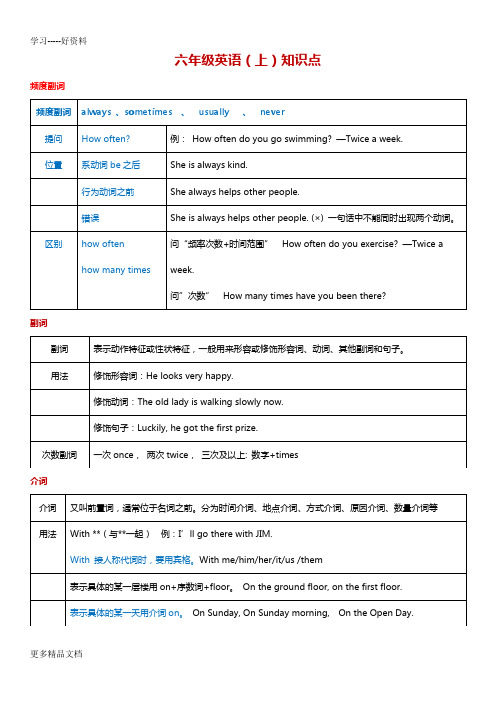
副词
表示动作特征或性状特征,一般用来形容或修饰形容词、动词、其他副词和句子。
用法
修饰形容词:He looks very happy.
修饰动词:The old lady is walking slowly now.
修饰句子:Luckily, he got the first prize.
次数副词
一次once, 两次twice, 三次及以上: 数字+times
someeggs. a lot of milk. Plenty of eggs.
我们熟练的掌握计算机应用,我们可以在网上搜索一些流行因素,还可以把自己小店里的商品拿到网上去卖,为我们小店提供了多种经营方式。Some
any
some用在肯定句中,any用于否定和疑问句中。
I have some new books. Do you have any new books? I don’t have any new books.
too many
too much
too few too little
too many +可数名词复数Too many sweets are bad for your teeth.
AB两地不相邻
A is north B.Beijing is north Nanjing.
9、如果你亲戚朋友送你一件DIY手工艺制品你是否会喜欢?AB两地接壤
可见“体验化消费” 广受大学生的欢迎、喜欢,这是我们创业项目是否成功的关键,必须引起足够的注意。A is on thenorth of B.Heilongjiang is on thenorth ofJilin..
在球类运动前不加定冠词
watching television
牛津小学英语6A Unit3词汇语法整理
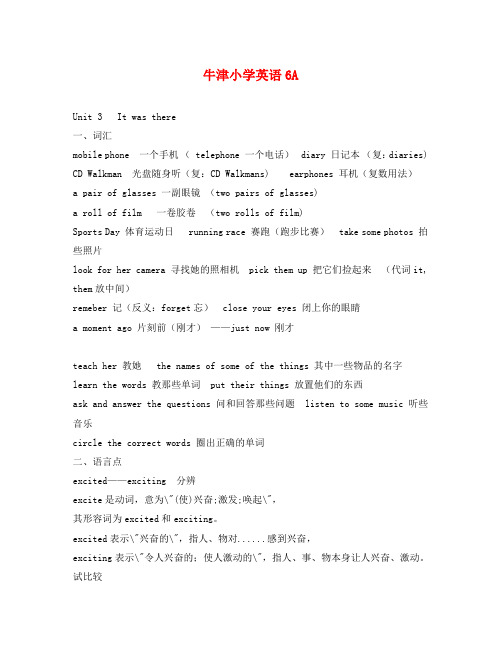
牛津小学英语6AUnit 3 It was there一、词汇mobile phone 一个手机( telephone 一个电话) diary 日记本(复:diaries) CD Walkman 光盘随身听(复:CD Walkmans) earphones 耳机(复数用法)a pair of glasses 一副眼镜(two pairs of glasses)a roll of film 一卷胶卷(two rolls of film)Sports Day 体育运动日 running race 赛跑(跑步比赛) take some photos 拍些照片look for her camera 寻找她的照相机 pick them up 把它们捡起来(代词it, them放中间)remeber 记(反义:forget忘) close your eyes 闭上你的眼睛a moment ago 片刻前(刚才)——just now 刚才teach her 教她 the names of some of the things 其中一些物品的名字learn the words 教那些单词 put their things 放置他们的东西ask and answer the questions 问和回答那些问题 listen to some music 听些音乐circle the correct words 圈出正确的单词二、语言点excited——exciting 分辨excite是动词,意为\"(使)兴奋;激发;唤起\",其形容词为excited和exciting。
excited表示\"兴奋的\",指人、物对......感到兴奋,exciting表示\"令人兴奋的;使人激动的\",指人、事、物本身让人兴奋、激动。
试比较Are you excited about going to Beijing? 你要去北京了,感到兴奋吗?He told us an exciting story yesterday. 他昨天给我们讲了一个使人激动的故事。
上海牛津版英语六年级第一学期6A期末复习知识点总结,推荐文档(2021年整理)
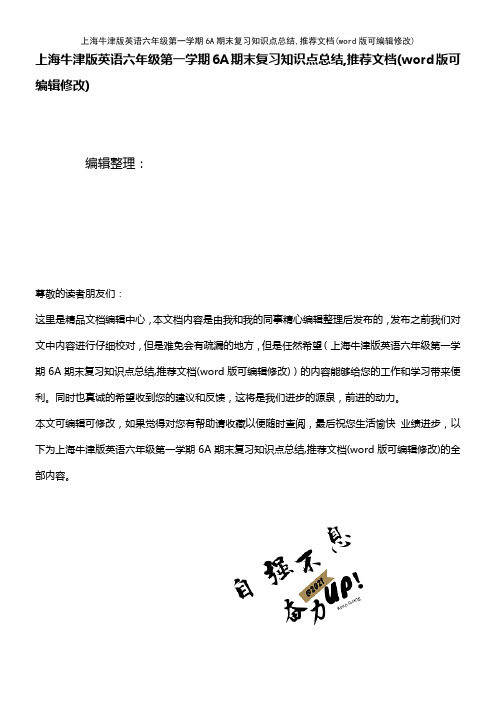
上海牛津版英语六年级第一学期6A期末复习知识点总结,推荐文档(word版可编辑修改)
编辑整理:
尊敬的读者朋友们:
这里是精品文档编辑中心,本文档内容是由我和我的同事精心编辑整理后发布的,发布之前我们对文中内容进行仔细校对,但是难免会有疏漏的地方,但是任然希望(上海牛津版英语六年级第一学期6A期末复习知识点总结,推荐文档(word版可编辑修改))的内容能够给您的工作和学习带来便利。
同时也真诚的希望收到您的建议和反馈,这将是我们进步的源泉,前进的动力。
本文可编辑可修改,如果觉得对您有帮助请收藏以便随时查阅,最后祝您生活愉快业绩进步,以下为上海牛津版英语六年级第一学期6A期末复习知识点总结,推荐文档(word版可编辑修改)的全部内容。
六年级英语(上)知识点频度副词
副词
介词
地点、方位表述
方位词:
代词 one 用来指代一个人或事物,而 ones 用来指代一些人或事物.定冠词 the用法:
数词、量词
交通工具
现在完成时
时间表达方式
疑问句
情态动词
花钱花时间
表示提议的句型
将来时
连词
比较级最高级
比较级、最高级构成
词组固定搭配
上海牛津版英语六年级第一学期6A期末复习知识点总结,推荐文档(word版可编辑修改)。
- 1、下载文档前请自行甄别文档内容的完整性,平台不提供额外的编辑、内容补充、找答案等附加服务。
- 2、"仅部分预览"的文档,不可在线预览部分如存在完整性等问题,可反馈申请退款(可完整预览的文档不适用该条件!)。
- 3、如文档侵犯您的权益,请联系客服反馈,我们会尽快为您处理(人工客服工作时间:9:00-18:30)。
6A Module 1 Family and friends
Unit 3 spending a day out together
知识点梳理
I. Useful words and expressions
1. What do you usually do at weekends, Miss Guo?
at weekends = at the weekend 在周末。
on weekdays 在工作日。
2. I usually go shopping in Sandy Bay.
地点名词前,介词用in。
3. This is a photo of my mother and me.
a photo of …一张……的照片。
a photo of me强调照片里有我,介词后用代词的宾格。
4. We are shopping together.
“am/is/are + 动词-ing”形式构成的现在进行时,用于描述正在发生的事情,或图片、照片中人物当时的活动。
e.g., I’m having lunch with my cousin. Is he drawing or singing?
5. Kitty and her friends are planning to visit a place in Garden City.
plan to do sth. 计划做某事。
plan的现在分词形式要双写planning。
6. That’s a good idea. 那是一个好主意!
常用于回答别人提出的建议。
7. Which place shall we visit?
助动词shall常用于征询对方的意见,往往用于第一人称。
e.g., Shall I open the window? What shall we buy for the picnic?
8. How are we going to get there?
get to到达。
get后接there、home等词时,必须省略to。
9. Let’s go by bus.
let’s 引导表示“提议”或“建议”的祈使句,后接动词原形。
let’s = let us 注意要用代词宾格。
“by + 交通工具”表示乘坐……。
e.g., by car, by bicycle, by train, by plane.
此句还可改成:let’s take a bus to go there. 注意take 后跟交通工具时,需加冠词。
II. Word study
III. Language explanation
1. Is Sandy Bay near or far away from Spring Bay?
near, 介词,在……附近,靠近……。
far away from, 介词短语,离……远,远离……。
2. I’ve been to Seaside Town on Lucky Island.
I’ve been to Green Market in Sunny Town.
通常表示“在某个区域内”时,用介词in;表示“在某个岛屿上”时,用介词on。
3. How are we going to get there?
am/is/are going to do 用于将来时,表示对将来的打算。
e.g., He is going to take some photos.
Are you going to visit Science Museum tomorrow?
4. Which place shall we visit?
which place 哪个地方,针对地点的提问。
5. What time on Saturday? When are we going to come back?
what time针对确切的时刻提问。
when提问的时间相对比较宽泛。
6. How are we going to get there?
how针对交通工具,方式方法提问。
7. How much does it cost?
how much针对价钱提问。
cost 花费,这里的主语it指代车费。
8. How about ten o’clock in the morning?
How about … ? ……怎么样,如何。
与what about 意思相近。
how about后接名词或动词-ing形式。
拓展阅读
Places to Visit in London
Hello, dear friends. Do you want to go to London? Come with me, I’ll show you some places of interest.
London has more than nine million visitors every year. They come and visit some of the most famous buildings in England –The Tower of London, St Paul’s Cathedral, the Houses of Parliament, Big Ben, etc.
You can see some of the most interesting places by getting。
